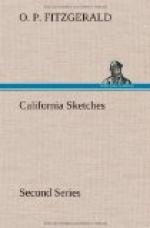“Me Cappin Charley,” tapping his chest complacently as he spoke.
Returning his salutation, I waited for him to speak again.
“You got grub—coche carne?” he asked, mixing his Spanish and English.
Some food was given him, which he snatched rather eagerly, and began to eat at once. It was, evident that Captain Charley had not breakfasted that morning. He was a hungry Indian, and when he got through his meal there was no reserve of rations in the unique repository of dishes and food which has been mentioned heretofore in these Sketches. Peering about the premises, Captain Charley made a discovery. The modest little parsonage stood on a steep incline, the upper side resting on the red gravelly earth, while the lower side was raised three or four feet from the ground. The vacant space underneath had been used by our several bachelor predecessors as a receptacle for cast-off clothing. Malone, Lockley, and Evans, had thus disposed of their discarded apparel, and Drury Bond and one or two other miners had also added to the treasures that caught the eye of the inquisitive Digger. It was a museum of sartorial curiosities—seedy and ripped broadcloth coats, vests, and pants, flannel mining-shirts of gay colors and of different degrees of wear and tear, linen shirts that looked like battle-flags that had been through the war, and old shoes and boots of all sorts, from the high rubber water-proofs used by miners to the ragged slippers that had adorned the feet of the lonely single parsons whose names are written above.
“Me take um?” asked Captain Charley, pointing to the treasure he had discovered.
Leave was given, and Captain Charley lost no time in taking possession of the coveted goods. He chuckled to himself as one article after another was drawn forth from the pile which seemed to be almost inexhaustible. When he had gotten all out and piled up together, it was a rare-looking sight.
“Mucho bueno!” exclaimed Captain Charley, as he proceeded to array himself in a pair of trousers. Then a shirt, then a vest, and then a coat, were put on. And then another, and another, and yet another suit was donned in the same order. He was fast becoming a “big Indian” indeed. We looked on and smiled, sympathizing with the evident delight of our visitor in his superabundant wardrobe. He was in full-dress, and enjoyed it. But he made a failure at one point—his feet were too large, or were not the right shape, for white men’s boots or shoes. He tried several pairs, but his huge flat foot would not enter them, and finally he threw down the last one tried by him with a Spanish exclamation not fit to be printed in these pages. That language is a musical one, but its oaths are very harsh in sound. A battered “stove-pipe” hat was found among the spoils turned over to Captain Chancy. Placing it on his head jauntily, he turned to us, saying, Adios, and went strutting down the street, the picture of gratified vanity. His appearance on Washington Street, the main thoroughfare of the place, thus gorgeously and abundantly arrayed, created a sensation. It was as good as a “show” to the jolly miners, always ready to be amused. Captain Charley was known to most of them, and they had a kindly feeling for the good-natured “fool Injun,” as one of them called him in my hearing.




